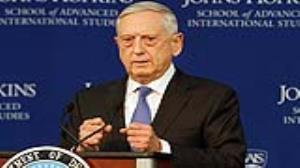And then we also have officers assigned to other nations' armed forces, or on duty in our embassies around the world, and they are also feeding from our friends -- they're feeding more ideas in, and certainly, they're keeping us updated on what they're seeing of potential adversary systems.
So you put it together in that manner, and then it becomes like a Rubik's Cube. As you move defensive and offensive capabilities together, you work with allies -- I'm on my way to Brussels here, in a couple weeks, to work with our allies again, as we look at what we call NATO capability gaps. They're not all going to be filled by us. Some of them are going to be filled by others, and that's the way it should be when democracies band together to defend the principles we stand on.
So it's an analysis, and then it's an assignment of priority, and then it's an allocation of resources. If you don't get the resources -- my closing words -- then your strategy is nothing more than a hallucination, because, without the resources, there's just so much brave young men and women can do.
|

